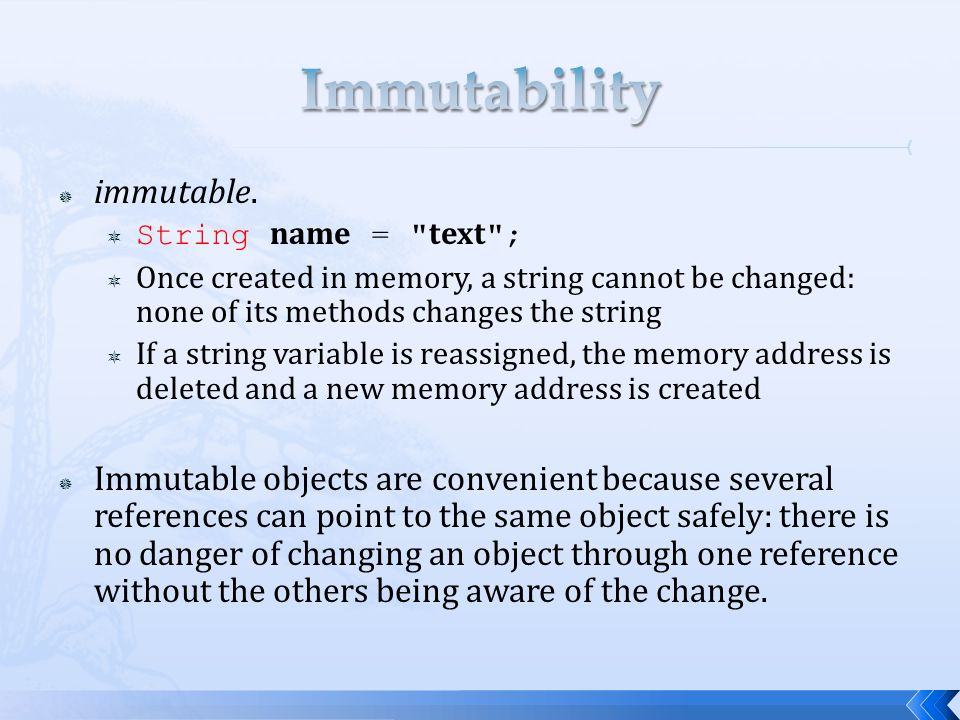Checking Out the Advantages of Immutable Strings in Modern Shows Paradigms
In the realm of modern-day programming paradigms, the idea of immutable strings stands as a foundation of robust software growth. By embracing immutable strings, designers can guarantee boosted data honesty, boosted thread safety and security, simplified debugging processes, enhanced security procedures, and reliable efficiency optimization.
Enhanced Information Integrity

By stopping the alteration of string items, immutability eliminates the danger of unintentional adjustments to the data they hold. This not just boosts the security of the details but likewise enhances the dependability of the code that counts on these strings.
Immutability also supports safer multithreading atmospheres, as simultaneous access to unalterable strings does not present the risk of data corruption through synchronised alterations. This building simplifies the process of dealing with strings in parallel programs situations.
Fundamentally, immutability works as a safety guard around the information saved within strings, improving their integrity by making certain that once defined, their values remain unchanged throughout the program's implementation.

Improved String Security
Unalterable strings improve the thread security of programs by making certain that as soon as a string object is produced, its value can not be changed. This property removes the threat of concurrent threads attempting to modify the same string simultaneously, which might bring about information corruption or irregular states in the program - Why are strings immutable in Java?. In a multi-threaded atmosphere, where numerous strings gain access to and adjust data all at once, the immutability of strings gives a level of security by ensuring that the data stays unchanged throughout its lifecycle
Simplified Debugging Processes
Offered the boosted string security helped with by immutable strings, a considerable benefit occurs in the realm of streamlined debugging processes. Unalterable strings, when produced, can not be altered, making it simpler to map the circulation of information and determine the resource of bugs in a program. This immutability makes certain that strings stay constant throughout the execution of the program, decreasing the possibility of unexpected adjustments that could cause errors.
When debugging with mutable strings, designers typically encounter concerns where a string's worth is modified inadvertently, making it challenging to pinpoint the root cause of a pest. Nevertheless, with immutable strings, the data stays the same, enabling programmers to concentrate on examining the real logic of the code instead of locating where and when a string was changed improperly.
Additionally, immutable strings streamline the debugging process by enabling simpler reproduction of bugs. Given that unalterable strings do not transform state, programmers can recreate and study insects better, Home Page bring about quicker recognition and resolution of problems within the codebase. This structured debugging workflow eventually adds to higher software top quality and enhanced overall growth effectiveness.

Raised Safety And Security Measures
Enhancing information protection and fortifying system integrity, the application of immutable strings in software application applications contributes dramatically to boosted protection procedures. Immutable strings, once developed, can not be modified, providing a crucial protection against destructive tampering or unauthorized access. By making sure that delicate information saved in strings stays unchanged throughout the program's implementation, the threat of information breaches or injection assaults is substantially reduced. Why are strings immutable in Java?. Immutable strings likewise play an essential role in stopping usual protection susceptabilities such as buffer overflows and SQL shot strikes, as efforts to adjust string information at runtime are inherently limited.
In addition, the immutability of strings enhances the predictability of program habits, making it less complicated to verify inputs and stop unexpected modifications Bonuses that might jeopardize safety. This predictability streamlines the process of auditing and verifying code, making it possible for developers to determine possible safety technicalities much more successfully. In general, incorporating unalterable strings right into software program advancement methods not just enhances the robustness and dependability of applications yet likewise enhances their durability against safety and security hazards.
Efficient Performance Optimization
When dealing with mutable strings, operations like concatenation or substring production frequently result in the creation of new string items, leading to memory overhead and boosted handling time. By enabling strings to continue to be unchangeable and consistent, immutable strings promote far better memory monitoring and caching opportunities, ultimately improving the general effectiveness of the software.
Given that unalterable strings can not be customized as soon as created, they can be shared across strings without the threat of unexpected adjustments, minimizing the requirement for synchronization devices and improving concurrency. Unalterable strings simplify debugging processes as programmers can trust that a string's worth will certainly stay regular throughout the program's implementation, eliminating potential errors triggered by mutable state adjustments.
Conclusion
Finally, the benefits of making use of unalterable strings in modern programming standards can not be overstated. Improved information honesty, boosted thread safety and security, simplified debugging procedures, increased protection actions, and efficient performance optimization all add to the overall effectiveness of shows jobs. By integrating unalterable strings right into programming practices, programmers can gain from a much more durable and reputable codebase.
Immutability, a key feature of strings in shows languages such as Java and Python, guarantees that as soon as a string things is developed, it can not be changed or customized.Unalterable strings improve the thread safety of programs by ensuring that once a string things is produced, its worth can not be customized. Immutable strings additionally play an essential function in preventing common security susceptabilities such as barrier overflows and SQL injection attacks, as attempts to manipulate string data at runtime are naturally restricted.
By allowing strings to continue to be continuous and unchangeable, immutable strings help with better memory management and caching possibilities, inevitably increasing the overall performance of the software.
Unalterable strings streamline debugging procedures find as developers can rely on that a string's worth will remain constant throughout the program's implementation, getting rid of possible errors triggered by mutable state changes.